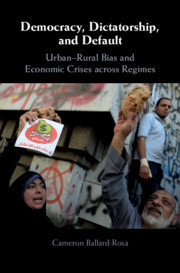Book contents
- Frontmatter
- Contents
- List of Figures
- List of Tables
- Acknowledgements
- 1 Introduction
- 2 Political Survival,Mass Politics, and Sovereign Default
- 3 Regime-Contingent Biases and Sovereign Default, 1960–2009
- 4 Default Pressures in Closed versus Electoral Autocracy: Zambia and Malaysia
- 5 Default Pressures in Consolidated versus Contentious Democracy: Costa Rica and Jamaica
- 6 Urban–Rural Pressures across Regime Types: The Case of Turkey
- 7 Conclusion
- Bibliography
- Index
4 - Default Pressures in Closed versus Electoral Autocracy: Zambia and Malaysia
Published online by Cambridge University Press: 31 July 2020
- Frontmatter
- Contents
- List of Figures
- List of Tables
- Acknowledgements
- 1 Introduction
- 2 Political Survival,Mass Politics, and Sovereign Default
- 3 Regime-Contingent Biases and Sovereign Default, 1960–2009
- 4 Default Pressures in Closed versus Electoral Autocracy: Zambia and Malaysia
- 5 Default Pressures in Consolidated versus Contentious Democracy: Costa Rica and Jamaica
- 6 Urban–Rural Pressures across Regime Types: The Case of Turkey
- 7 Conclusion
- Bibliography
- Index
Summary
This chapter begins with the case of Zambia under the rule of Kenneth Kaunda, a regime that became increasingly centered on urban consumers as a crucial base of support.As expected by my theory of urban bias in closed autocracies, the Zambian regime pursued a number of cheap food policies, particularly for maize, the staple crop.Yet, as the fiscal costs of these programs began to mount, the government repeatedly proved unwilling to remove such food subsidies, even under increasing pressure from the IMF, culminating in default on Zambia's debt after a major protest triggered by attempts to limit food subsidies.Yet, this over-riding concern for urban consumers is contrasted against the strong state support for rural agriculturalists in the Malaysian case, where the dominant UMNO regime relied on turnout of rural supermajorities to maintain rule in a system of electoral autocracy.While still sensitive to urban costs of living, at no point did Malaysian policy become overwhelmingly biased towards one geographic area; when faced with fiscal crisis in the 1980s, this also eased the ability of the government to reform a series of burdensome state programs and avoid default.
- Type
- Chapter
- Information
- Democracy, Dictatorship, and DefaultUrban-Rural Bias and Economic Crises across Regimes, pp. 80 - 115Publisher: Cambridge University PressPrint publication year: 2020



